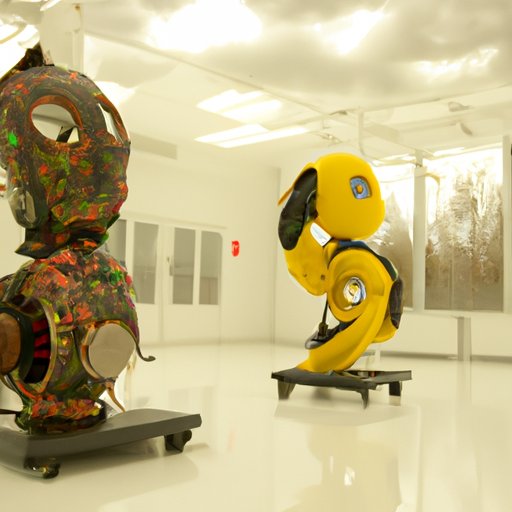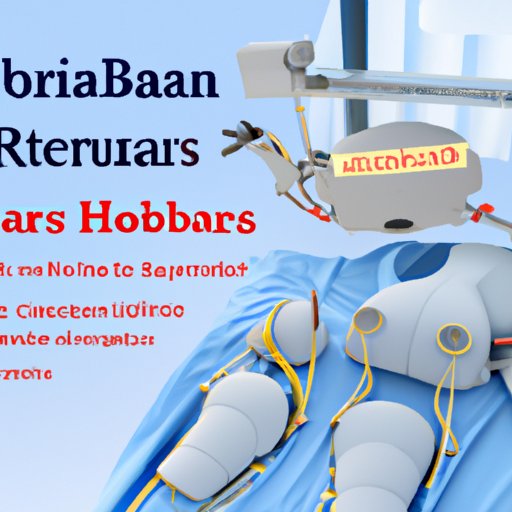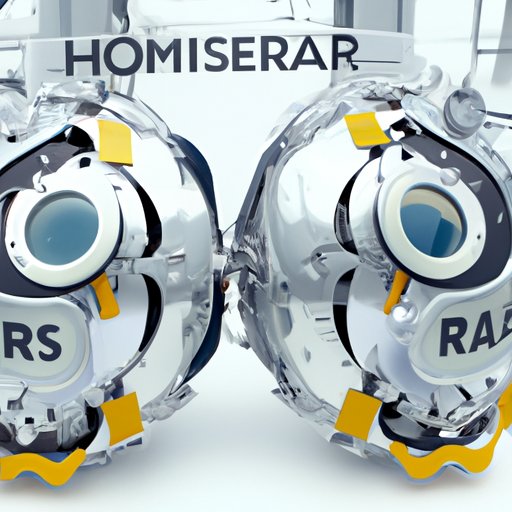Introduction
Robotic hernia surgery is an advanced form of minimally invasive surgery that is becoming increasingly popular. During this type of procedure, a surgeon uses a robotic system to control miniature instruments which are inserted into the body through small incisions. This technology allows for greater precision, accuracy, and flexibility than traditional laparoscopic or open hernia surgery. The purpose of this article is to explore the safety of robotic hernia surgery, including its potential benefits and risks for patients.

Analyzing the Pros and Cons of Robotic Hernia Surgery
Robotic hernia surgery is generally considered to be safer than traditional hernia repair techniques due to its minimal invasiveness. However, there are still some potential risks associated with the procedure, so it is important to weigh the pros and cons before deciding if it is right for you. Here are some of the advantages and disadvantages of robotic hernia surgery.
Advantages of Robotic Hernia Surgery
Robotic hernia surgery offers many benefits compared to traditional hernia repair techniques. One of the biggest advantages is the reduced risk of complications. According to a study by the Department of Surgery at Stanford University Medical Center, the rate of major complications was significantly lower in robotic hernia repair operations compared to open or laparoscopic procedures (1). Additionally, robotic hernia surgery requires smaller incisions, resulting in less pain and faster recovery times. Furthermore, the robotic system provides surgeons with enhanced visualization, dexterity, and precision during the operation.
Disadvantages of Robotic Hernia Surgery
Robotic hernia surgery is not without its drawbacks. One of the main disadvantages is the cost. Robotic hernia surgery is typically more expensive than traditional hernia repair techniques. Additionally, the procedure requires specialized equipment and staff, which can further increase costs. Additionally, while robotic hernia surgery is generally considered safe, there is still a risk of infection or other complications.
Examining the Safety of Robotic Hernia Surgery from a Patient Perspective
When considering whether robotic hernia surgery is safe, it is important to look at the potential benefits and risks from a patient perspective. Here is a closer look at what patients can expect from robotic hernia surgery.
Benefits of Robotic Hernia Surgery for Patients
Robotic hernia surgery offers several benefits for patients. First and foremost, the procedure is minimally invasive and results in less pain and shorter recovery times compared to open or laparoscopic repairs. Additionally, robotic hernia surgery has been shown to reduce the risk of major complications such as infection, bleeding, and hernia recurrence (1). Furthermore, the robot-assisted technology allows surgeons to perform complex repairs with greater precision and accuracy, resulting in better outcomes.
Potential Risks for Patients Undergoing Robotic Hernia Surgery
As with any surgical procedure, there are risks involved with robotic hernia surgery. The most common risks include infection, bleeding, and nerve damage. Additionally, there is a risk of organ damage if the robotic instruments are not used properly. Finally, there is a risk of hernia recurrence following the procedure.

Exploring the Risks Involved with Robotic Hernia Surgery
When considering the safety of robotic hernia surgery, it is important to examine both the short-term and long-term risks associated with the procedure.
Short-Term Risks of Robotic Hernia Surgery
The most common short-term risks of robotic hernia surgery include infection, bleeding, nerve damage, and organ damage. These risks can be minimized by choosing an experienced surgeon and making sure that all necessary precautions are taken during the operation. Additionally, it is important to follow your doctor’s instructions regarding post-operative care.
Long-Term Risks of Robotic Hernia Surgery
In addition to the short-term risks associated with robotic hernia surgery, there are also potential long-term risks. These include a risk of hernia recurrence, which can lead to ongoing pain and discomfort. Additionally, there is a risk of complications such as adhesions, which can cause intestinal blockage or obstruction. Finally, there is a risk of developing chronic pain or disability due to nerve damage.
Investigating the Long-Term Effects of Robotic Hernia Surgery
It is important to consider the long-term effects of robotic hernia surgery when assessing its safety. Here are some of the potential impacts on quality of life after the procedure.
Impact on Quality of Life After Robotic Hernia Surgery
Robotic hernia surgery can have a significant impact on a patient’s quality of life. In general, the procedure results in less pain and quicker recovery times compared to traditional hernia repair techniques, allowing patients to return to their normal activities sooner. Additionally, robotic hernia surgery has been shown to reduce the risk of hernia recurrence and complications, leading to improved outcomes and better long-term health.
Risk of Recurrence or Complications Following Robotic Hernia Surgery
Although robotic hernia surgery is generally considered safe, there is still a risk of hernia recurrence or complications following the procedure. Therefore, it is important to discuss the potential risks with your doctor before undergoing the surgery. Additionally, it is important to follow your doctor’s instructions regarding post-operative care to reduce the risk of recurrence or complications.

Comparing Robotic Hernia Surgery to Traditional Hernia Surgery
When evaluating the safety of robotic hernia surgery, it is important to compare it to traditional hernia repair techniques.
Comparing Benefits of Robotic vs. Traditional Hernia Surgery
Robotic hernia surgery offers several advantages over traditional hernia repair techniques. For example, the procedure is minimally invasive and results in less pain and quicker recovery times compared to open or laparoscopic repairs. Additionally, the robotic system provides surgeons with enhanced visualization, dexterity, and precision during the operation, resulting in better outcomes. Finally, robotic hernia surgery has been shown to reduce the risk of major complications compared to traditional hernia repair techniques.
Comparing Risks of Robotic vs. Traditional Hernia Surgery
Robotic hernia surgery is generally considered to be safer than traditional hernia repair techniques due to its minimal invasiveness. However, there are still some potential risks associated with the procedure, so it is important to weigh the pros and cons before deciding if it is right for you. The most common risks of robotic hernia surgery include infection, bleeding, and nerve damage, while the most common risks of traditional hernia repair techniques include wound infection and hernia recurrence.
Conclusion
Robotic hernia surgery is an advanced form of minimally invasive surgery that offers several benefits for patients. The procedure is generally considered to be safer than traditional hernia repair techniques due to its minimal invasiveness and reduced risk of major complications. Additionally, robotic hernia surgery typically results in less pain and quicker recovery times compared to traditional hernia repair techniques. However, it is important to weigh the potential risks and benefits before deciding if robotic hernia surgery is right for you. Ultimately, the decision should be made with the guidance of a qualified healthcare professional.
Summary of Findings
Robotic hernia surgery is an advanced form of minimally invasive surgery that offers several benefits for patients. The procedure is generally considered to be safer than traditional hernia repair techniques due to its minimal invasiveness and reduced risk of major complications. Additionally, robotic hernia surgery typically results in less pain and quicker recovery times compared to traditional hernia repair techniques. However, it is important to weigh the potential risks and benefits before deciding if robotic hernia surgery is right for you.
Recommendations for Patients Considering Robotic Hernia Surgery
If you are considering robotic hernia surgery, it is important to speak with a qualified healthcare professional to discuss the potential risks and benefits. Additionally, it is important to follow your doctor’s instructions regarding post-operative care to reduce the risk of complications. Finally, make sure to weigh the potential risks and benefits before deciding if robotic hernia surgery is right for you.
(Note: Is this article not meeting your expectations? Do you have knowledge or insights to share? Unlock new opportunities and expand your reach by joining our authors team. Click Registration to join us and share your expertise with our readers.)
